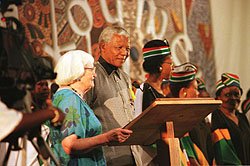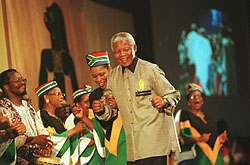Excitement built across the University of Zimbabwe campus over the next 24 hours. By 2:00 on Sunday afternoon an expectant crowd of more than 3000 people packed the Great Hall, the site of assembly plenary sessions. Others gathered outside in the giant overflow tent set up for visitors. Security officers in dark suits joined uniformed campus guards on the stage and at every entrance.

South African President Nelson Mandela and
Photo by Chris Black/WCC
Dr Pauline Webb at the Jubilee celebration
Click on the photo to order (ref. 7177-22a)

